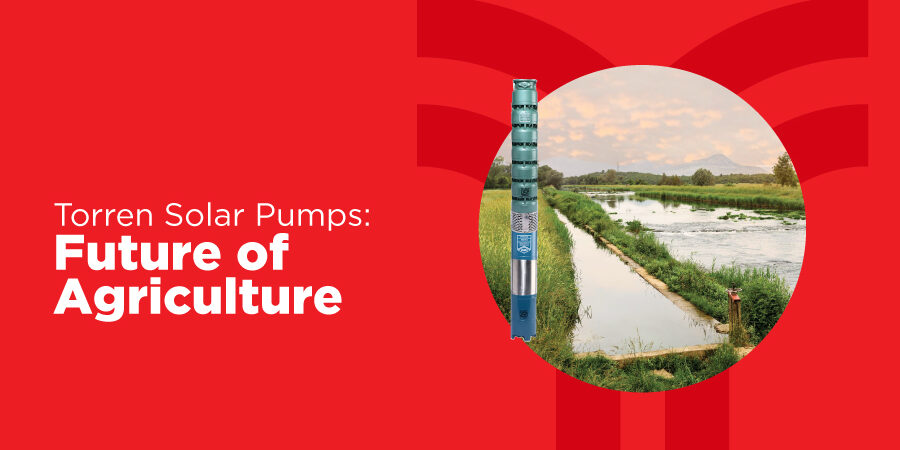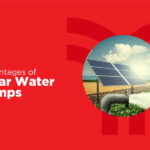Agriculture’s bright future with torren solar pumps
Through the supply of electricity to farmers for tasks such as water pumping and crop harvesting, solar water pumping devices are revolutionizing the agriculture industry. Artificial methods such as pumps are used to supply water for irrigation. Farmer pumps are run via diesel generator sets or the grid, which results in substantial delays and financial strain. For this reason, efficient irrigation systems like solar water pumps are extremely beneficial to farmers. It increases crop output by providing a consistent and continuous water flow to their fields. By using photovoltaic technology to convert solar energy into electricity, solar water pumps can replace diesel-powered pumping devices which produce emissions and have inconsistent grid supply. A solar component powers a solar water pump, which aids in surface or groundwater pumping. Here this guide provides insights into agriculture’s future with the solar pump manufacturers in coimbatore.
What are the benefits of the solar water pump?
The solar water pump’s primary benefit is that it uses sunlight for free. Similar to how solar water pumps reduce your dependency on petroleum or energy, once set up, neither fuel nor power bills emerge again.
- The maintenance required for solar water pumps is far lower than that for traditional water pumping systems. Since solar water pumps have fewer moving parts than conventional water pumps, their chance of breaking down is significantly lower.
- The task is not affected by power failures, low voltage, or single-phase issues like those with solar water pumps because there is less reliance on electricity and fuel. Compared to traditional electric pumps, these are far more dependable in remote areas with inconsistent electrical power.
- Since solar water pumps don’t need fuel to run, they are more environmentally friendly than other water pumps that run on propane or diesel, which produce noise pollution and air pollution. These solar water pumps don’t emit any dangerous materials which could lead to major problems like global warming because they are fuelled on a conventional source of electricity.
- Farmers may find solar water pumps to be an absolute necessity. Farmers may be able to make money from the solar water pumps. Also using the excess energy for irrigation, farmers can sell it to the system. Significantly, a farmers’ incentive is additionally offered.
Challenges of solar water pump:
- Small-scale farmers may find the initial setup costs of solar water pumps costly, even though they provide long-term cost benefits. Financial limitations may prevent many farmers from making initial investments in solar technology.
- Solar open well submersible pumps require routine maintenance even if they have fewer moving parts. It’s crucial to make sure solar panels are cleaned properly and to take quick care of any technical problems. One problem could be not knowing about or not having access to repairs and maintenance.
- The necessary space is required for the installation of solar panels. Identifying appropriate sites can be challenging in places with high population densities or land scarcity. It can be difficult to balance the use of agricultural land for solar panel placement, particularly in large-scale projects.
- Sunlight is required for solar pumps to function. Pumping water could prove to be possible on days when it’s cloudy or at night. For irrigation to be consistent, water availability must correspond to solar power generation.
- When there isn’t much sunlight, solar pumps frequently employ battery storage to supply water. Two important problems are regulating the lifespan of batteries and ensuring dependable battery backup systems.
- Farmers might not believe in solar power systems or they might be wary of new technologies. It’s critical to foster confidence through effective case studies and presentations.
India’s varied landscape presents difficulties with dealing with temperature, landscape, and solar intensity. It is essential to customize solar pump systems to local conditions.
Tips for installing solar water pumps:
- Follow the instructions provided by the manufacturer for the necessary wiring and connecting steps to install your solar panel and pump. Make sure that the pump and solar panel are securely grounded.
- Maintaining your solar panel and pump in optimal working order requires routine maintenance. This includes tasks like testing electrical components, wiping the solar panel and pump, and looking for leaks.
- There are many common issues to look out for if your pump isn’t working correctly, including inadequate water flow, broken solar panels, and clogs in the pump or pipes. Consult with the manufacturer’s instructions or a qualified pump specialist for repair tips.
Conclusion: If you’re looking for a consistent source of water supply for agricultural needs, consider switching to solar pumping solutions with Torren pumps, one of the pump manufacturers in Coimbatore. Solar pumps provide an innovative and sustainable option for agriculture, replacing traditional pumps in a way that is both economical and environmentally friendly. When selecting and using a solar pump, it is critical to examine factors such as the required water volume, the pump’s capacity, the power of the solar panels, and cost analysis. A system needs to be installed and maintained properly for it to function securely and effectively.

